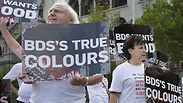
South Africa's Jews have no reason for concern, for now
Op-ed: For the time being, it is highly unlikely that the proposed change to the existing dual citizenship policy, to prevent South African Jews from serving in the IDF, will have any practical outcome.
The proposed change to existing policy, which allows South Africans who take up the citizenship of other countries and retain their South African citizenship, was primarily being pushed by Obed Bapela, deputy minister of Co-operative Governance and Traditional Affairs and Chairperson of the ANC’s National Executive Committee on International Relations.
Bapela's stated reason for why he believed that the dual citizenship question needed to be reviewed was that many people were supposedly "abusing the right by taking up arms for other countries."
Had he argued for this as a matter of general principle that applied across the board, his comments would have attracted little attention.
However, Bapela made no secret of the fact that he had a particular group in mind, namely the South African Jewish community, and that his primary purpose in advocating the change was to prevent (or at least discourage) its members from serving in the Israel Defense Forces.
As one would expect, the response of the local Jewish leadership was one of outrage. In a joint media statement, the SA Jewish Board of Deputies (SAJBD) and SA Zionist Federation charged that by proposing a change to existing law purely to prevent South African Jews from having a relationship with Israel, Bapela was "undermining the very core value of South Africa's democracy." Nor was this the first time that Bapela, a dogmatic proponent of the Boycott Divestment and Sanctions (BDS) strategy of isolating Israel, had attacked the Jewish community and its leadership.
The statement continued: "The singling out of any minority group for discrimination is ominous for South Africa's democracy. In a country which battles against racism and xenophobia on a daily basis, Bapela is further inflaming divisions within our society."
In a series of debates and interviews on national radio and television, SAJBD President Zev Krengel accused the deputy minister of calling into question Jewish loyalty to South Africa. Predictably, Bapela denied that any particular group was being targeted, but in a revealing on-air remark, said that Jews should understand that the proposed new measures were not against them as individuals but against the policies of "their government."
An angry Krengel immediately took him to task: "Don’t say 'their government.' I am a South African, I have one government and my leader is President Zuma. That is what you are trying to do - the whole dual loyalty bit. You say that you are not anti-Jewish or anti-Semitic, but your remarks and your actions are."
It was not only the Jewish community whoslammed Bapela’s comments. Overwhelmingly, the public response decisively rejected the notion. Commentators pointed out that , amongst other things, any legislation aimed at depriving people of their South African citizenship would not pass constitutional muster, given that the Bill of Rights stated unambiguously that "no citizen may be deprived of citizenship."
More importantly, Bapela's proposals would appear to have been soundly squelched by his colleagues, both within government and the ANC. Home Affairs Minister Malusi Gigaba stated unequivocally that there were no plans to review dual citizenship laws, adding that views expressed by individuals within the party did "not necessarily reflect the views of government, of Cabinet or the Department of Home Affairs in particular and certainly … not … the collective decisions of the ruling party itself."
The ANC itself issued a statement confirming that it had "noted a concern from many South African nationals, including those of Jewish heritage, on the supposed intention to penalize nationals holding dual citizenship" and clarified that the ANC had not taken any decision on such a matter, nor did it intend introducing such a policy.
For his own part, Bapela remained defiant, saying that "no organized force," particularly the SAJBD, would "intimidate the ANC into not discussing the issue." That being said, it is highly unlikely that the status quo regarding dual citizenship, even if it is brought up for discussion at the forthcoming ANC National General Council in October, will be affected.
That Bapela did not come up with the notion of taking action against Jews who serve in the IDF on his own can be assumed as a matter of course. For a good many years, hard-line Islamist advocacy groups have been advocating this, both at the political level and through legal channels. On occasion, this incitement has resulted in overt threats of vigilante action being made against the Jewish community, notably by representatives of the Congress of South African Trade Unions.
For the time being, at least, it is highly unlikely that this agitation will have any practical outcome. It is significant that in propagating his views about the dual citizenship question, Bapela essentially found himself on his own, with no voices even within his own party being raised in his support.
This, combined with the forthright manner in which government has denied that any changes to the law are being contemplated, has done much to calm the concerns of South African Jewry.
David Sacks is the associate director of the South African Jewish Board of Deputies.










